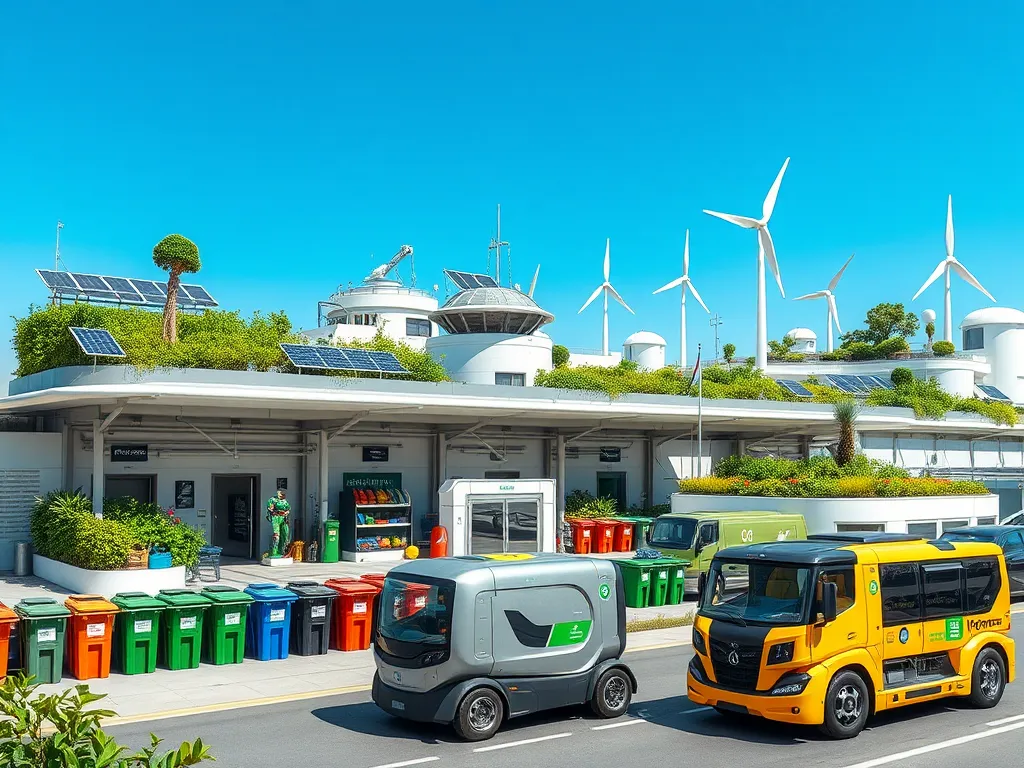Innovative Strategies for Future Waste Management Solutions

Future Waste Management: Innovations and Strategies for a Sustainable Tomorrow
As we navigate the challenges posed by an ever-increasing population and consumption patterns, the future of waste management emerges as a critical focus for environmental sustainability. Future waste management involves the integration of advanced technologies, community engagement, and sustainable practices to effectively manage waste while minimizing its impact on the environment. By rethinking waste management, we can work towards a cleaner, more sustainable future that aligns with the goals of a circular economy.
Future waste management strategies prioritize innovative technological solutions that enhance efficiency and efficacy in waste collection and disposal. These strategies leverage advancements in artificial intelligence (AI), the Internet of Things (IoT), and automation to streamline operations, reduce costs, and improve recycling rates. As municipalities and waste management companies adopt these technologies, we can expect a significant transformation in how waste is managed, leading to a cleaner environment and a more sustainable future.
Moreover, the future of waste management encompasses a comprehensive approach that includes sustainable solutions aimed at waste reduction. This includes initiatives aimed at minimizing waste generation, promoting recycling, and paving the way for the adoption of a circular economy. By encouraging consumers and businesses to participate in zero-waste practices and consider the lifecycle of products, we can cultivate a culture of sustainability that transcends traditional waste management practices.
Policy and regulation will also play a pivotal role in shaping future waste management practices. Governments at all levels will need to enact and enforce regulations that support innovative practices, promote responsible waste management, and impose penalties on non-compliance. International treaties and collaborations will also be vital in addressing the transboundary nature of waste and ensuring that countries collectively work towards effective waste management solutions.
Communities will be essential in driving the future of waste management. Grassroots initiatives, community recycling programs, and awareness campaigns can foster a culture of sustainability at the local level. When individuals and communities take active roles in waste reduction and management, it creates a ripple effect that encourages wider societal changes and strengthens partnerships between communities and waste management providers.
Effective waste management strategies in Deschutes County are essential for sustainable community growth.
Technological Innovations in Waste Management
One of the most significant advancements in future waste management is the use of smart bins equipped with IoT sensors. These bins can monitor waste levels in real time, optimizing collection routes and schedules based on actual need, thus reducing fuel consumption and operational costs, while also ensuring timely waste pickup.
AI and machine learning are being harnessed to enhance recycling optimization. These technologies can analyze data from recycling operations, identifying patterns and inefficiencies, which lead to improved sorting mechanisms and higher recovery rates for recyclable materials.
Automated waste sorting technologies are revolutionizing waste processing facilities. With the integration of robotics and AI, these systems can automatically identify and sort a wide range of materials faster and more accurately than human workers, minimizing contamination and enhancing recycling rates.
Blockchain technology is emerging as a powerful tool for waste tracking and management. By creating transparent, tamper-proof records of waste disposal and recycling processes, blockchain can increase accountability among stakeholders, ensuring that waste is managed according to regulations and best practices.
Sustainable Solutions for Waste Reduction
Zero waste initiatives encourage individuals and organizations to redesign their approach to waste, seeking to prevent waste generation in the first place. Strategies include promoting reusable products, encouraging product design that minimizes waste, and implementing take-back and repair programs.
The circular economy's impact on waste management is profound; it focuses on maximizing the lifecycle of products through repair, reuse, and recycling. By transitioning from a linear economy to a circular model, businesses can significantly reduce waste while creating new economic opportunities.
Composting and organic waste solutions play a crucial role in future waste management. By diverting organic materials from landfills and turning them into nutrient-rich compost, communities can reduce waste, improve soil health, and close the loop in the garden economy.
Educational programs are vital in promoting waste minimization. Schools, community centers, and nonprofits can provide resources and training on waste reduction methods, fostering awareness and encouraging individuals to adopt sustainable practices in their daily lives.
Policy and Regulation in Waste Management
Government regulations play an essential role in shaping the landscape of waste management. Strategic policies can encourage recycling efforts, set waste reduction targets, and mandate the use of eco-friendly materials, paving the way for smoother transitions to sustainable practices.
International treaties focused on waste management, such as the Basel Convention, dictate how countries handle hazardous waste, promoting responsible disposal and reducing illegal dumping practices across borders. These agreements establish norms for waste management that support environmental integrity globally.
Local governments often serve as the frontline in waste management policy implementation. They must develop and adapt regulations to the unique needs of their communities while also engaging residents in sustainable waste practices, ultimately enhancing local environmental quality.
Future legislation trends may include broader adoption of extended producer responsibility (EPR) laws, where manufacturers are held accountable for the entire lifecycle of their products, incentivizing sustainable product design and waste reduction throughout supply chains.
Community Involvement in Waste Management
Community recycling programs have become an integral part of future waste management. These programs not only enhance recycling rates but also foster community spirit and collaboration, as residents unite to reduce waste and promote sustainability.
Community clean-up events significantly impact local ecosystems and raise awareness of waste management issues. These events allow residents to take pride in their surroundings, while also serving as educational opportunities to discuss proper waste disposal and recycling practices.
Educational outreach initiatives can elevate waste awareness within communities. By providing clear and accessible information on waste management practices, individuals are better equipped to make informed choices, fostering a culture of sustainability from the ground up.
Partnerships between communities and waste management firms can lead to enhanced service delivery, innovative solutions, and community-driven waste management strategies. Collaborations can create synergies that drive positive change and improve local waste management infrastructure.
Future Trends in Waste Management
Emerging trends in waste processing technologies, such as anaerobic digestion and waste-to-energy systems, are expected to gain traction in future waste management strategies. These technologies convert waste into energy, reducing landfill volume while providing a renewable energy source.
The role of renewable energy in waste management will likely expand, with energy recovery from waste becoming a more mainstream practice. By harnessing waste as a resource, communities can significantly reduce carbon footprints and enhance energy sustainability.
Predicted changes in consumer behavior will significantly affect future waste management. As awareness of environmental issues grows, more consumers are expected to seek sustainable products, leading companies to adopt eco-friendly practices and reduce waste generation.
Global shifts in waste management practices will increasingly reflect united efforts to combat environmental challenges. By sharing best practices and collaborating across borders, countries can develop innovative strategies for effective waste management that prioritize sustainability and environmental protection.
